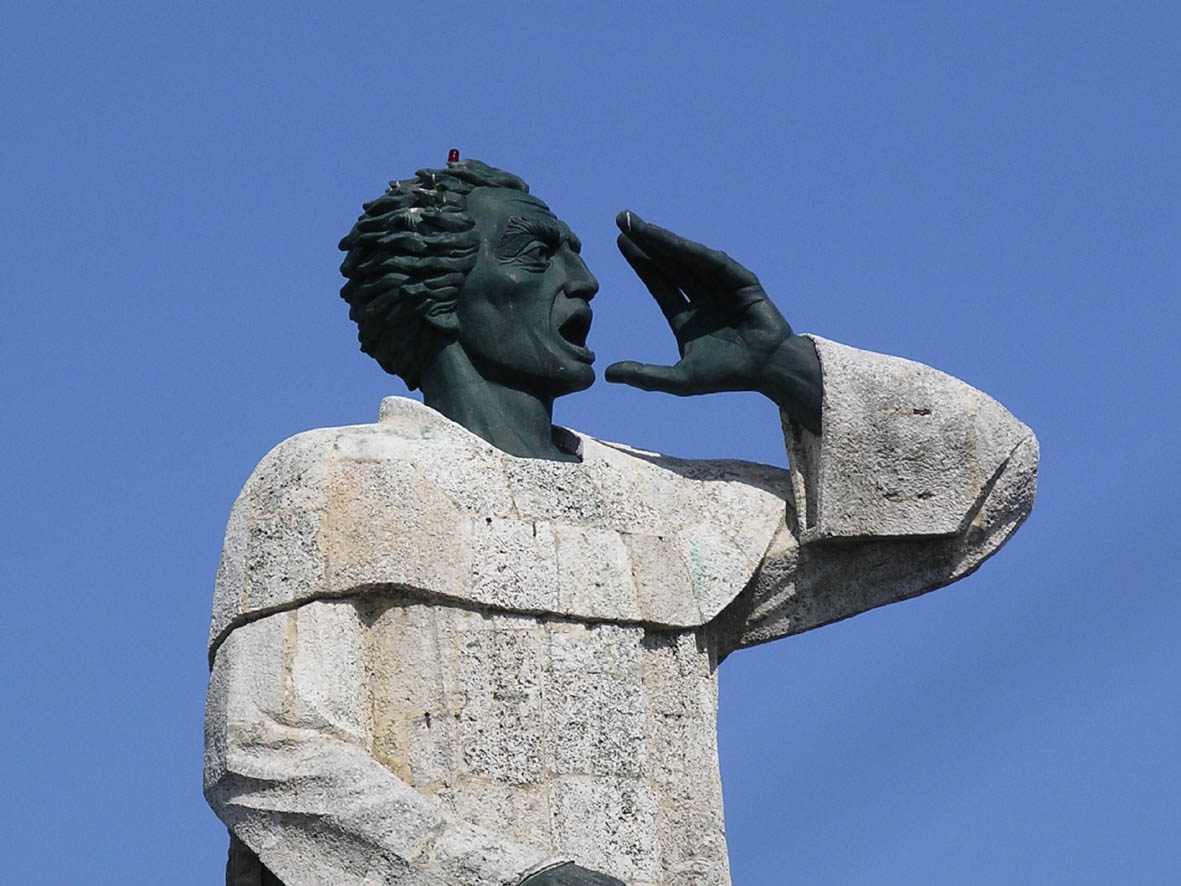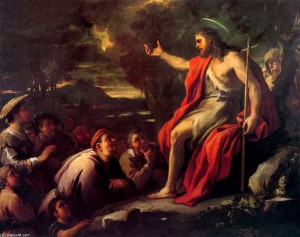The season of Advent is the season of hope, which is the virtue of the pilgrim – of our life. Hope like a coin has two faces: one relates us to God; another, to the neighbor, particularly the poor and needy neighbor. Advent then is a special time for Christians to become more aware of and committed to the poor around us and in our world.
            Concerning the love of preference for our poor neighbors, the Gospel of Jesus Christ is focused on the proclamation of justice and love, which are the two main social values and virtues to be preached and practiced by Christians – and many other believers and men and women of good will. This proclamation includes the denunciation of injustices, and the announcement and witnessing of justice and love.
            Social action is a constitutive dimension of the “preaching of the Gospel, or the Church’s mission†(Synod of Bishops’ 71). A shining moment of the proclamation of the social Gospel is represented by the well-known Homily of Dominican Father Antonio Montesinos for the Third Sunday of Advent of the year 1511 in the Isla Española, now the Dominican Republic. As asked by their latest General Chapter (Rome 2010), the Dominicans throughout the world are re-calling this Advent of 2011 the prophetic Advent Sermon preached 500 years ago.
       What makes that prophetic sermon still more relevant for us Dominicans today  is the fact that it was prepared not only by Montesinos but by the whole Dominican community. The community read the signs of their times and interpreted them according to the Sacred Scriptures and the consequent teachings of the Fathers of the Church and, in particular of Saint Thomas Aquinas (cf. II-II, 66).The Dominican community of the Española applied courageously the doctrine taught by the Dominican Masters of Theology at the University of Salamanca regarding the equality of all human beings, including the natives of Latin America, who were unequally treated by the greedy colonizers of that time.  Montesinos thundered from the pulpit five hundred years ago in Central America:
By what right and by what justice do you hold these Indians in such a cruel and horrible servitude? With what authority have you carried out such detestable wars against these people who were living in their meek and peaceful lands that you have consumed with deaths and ravages never heard of? How can you hold these peoples so oppressed and exhausted by not giving to them the food they need to eat, and by not healing their illnesses which are due to the excessive works you force upon them? Thus they die, or –better said – you kill them in order to acquire the precious gold every day! Do you care at all about letting them know God as their Creator… and fulfill their Sunday obligation? Are these people not human beings? Don’t they have rational souls? Are you not obliged to love them as you love yourselves? … Be sure that in this state in which you are you will not be saved…
            After that incredible sermon, the authorities attending the Mass, the masters of the Indians complained to the Superior of the community, Fr. Pedro de Córdoba, and asked him to call the attention of Montesinos, punish him for this “new doctrine,†and ask him to recant what he had said at the following Sunday Mass, the Fourth Sunday of Advent. If the preacher would not correct himself and apologize they all will be sent back to Spain. Thereafter, the community prepared another sermon for the Fourth Sunday of Advent. Montesinos proclaimed it again: not recanting at all what he had said the previous Sunday, but reaffirming again with strong words the same radical and prophetic message. On the Fourth Sunday of Advent, he reportedly said:
You are enslaving the natives. If you continue like this, we shall not hear your confession. And know that we believe that we are not offending the King. On the contrary, we are thus serving God and also the King of Spain.Â
Again, Montesinos called the rich and powerful to repent and change their unjust and merciless misbehavior against the dignity and the kindness of the natives.
            The enslavement of the poor by the insensitive rich and powerful – and also by the indifference of many of us who could do something to remedy this cruel situation but do not -, continues to be a terribly negative sign of our times: injustices, violence, greed, human trafficking, discrimination based on sex, age, nationality or ethnic, religion are still here in our developed and developing world. What to do? Imitate the courage and witnessing of Montesinos and others. We are asked by our humanity and our faith to continue condemning injustices, but at the same time giving always hope to our people like the true prophets of yesterday and today, and like the Prophet, Jesus Christ.
            Indeed, and following the social teachings of the Church – more explicit and   radically since John XXIII – and of the best theologians of liberation, we have to continue denouncing evils and call them by their proper names. But this is not enough at all. It is so easy and generally so useless to merely condemn others and called them to change. Moreover, the signs of the times require from the preachers and teachers of the Word to discern the situation and the context in which they are. At times, it might not be convenient or prudent to denounce injustices. Even, announcing the doctrine of justice and love may be at times, perhaps, useless and counterproductive. After all, people are a bit tired of listening to so many empty words! We are asked to be witnesses of Christ not only with our words but also with our silences, and above all, with good deeds of justice and love. A Christian knows, as Benedict XVI tells us, “when it is time to speak of God and when it is better to say nothing and to let love alone speak†(Deus Caritas Est, 2005).
Charity indeed begins at home, that is, in our communities and in our hearts. If the community of Pedro de Córdoba was able to prepare those prophetic sermons, it was because their members lived – singly and collectively – a frugal and simple life style. Besides, they were close to the poor, who loved them. According to our tradition, the Dominican communities have to be preaching communities. This communitarian preaching requires change in each member of the different communities. We have to begin to change individually. Yes, “let there be love,†but “let it begin with me!†This is, certainly, an excellent way of celebrating modestly and effectively the Sermon of Montesinos 500 years later. If there be no change in our personal heart – in our communities -, the celebration, the living memory of this Advent Sermon may be no more than an external and superficial celebration.
            Five hundred years ago, on the Third Sunday of Advent, Montesinos began his homily with the words of St. John the Baptist, the forerunner of Christ: “Ego sum vox clamantis in deserto†(“I am the voice of one crying in the desert.†Yes, he added, “I am the voice crying out in the desert of this Island.† John the Baptist tells us again in the Gospel for the Third Sunday of Advent (2011): “Make straight the way of the Lord†(Jn 1:23). He invites us this year – as he invited the Dominican community of the Española and many other exemplary communities of missionaries throughout history – to work for justice and love as an essential way to proclaim the Gospel of Jesus of Nazareth. If we proclaim in words and above all in good deeds this constitutive element of the Gospel, we shall contribute significantly to the transformation of the world and thus we will be saved. Jesus – the One who is to come this Christmas and at the end of time and always – keeps telling us: “I was hungry and you gave me food. I was thirsty and you gave me a glass of water… What you do to the least of my brothers and sisters, you do it to me†(see Mt. 25, 31-46).
            As I recall the powerful homily of Montesinos, I remember the words of the great preacher Fr. Lacordaire: “We the Dominicans (and all other preachers) will be effective in our ministry when the Word, dead and buried in books, comes to life in our lips and in our life.†At the end, when all is said and done, we have to say: “Only love is credible†(Urs von Balthasar).
Fausto Gomez, OP
Third Sunday of Advent
 Macau, December 2011



